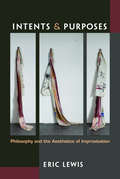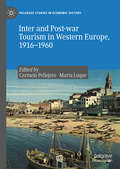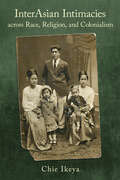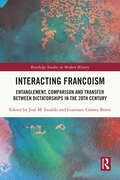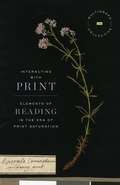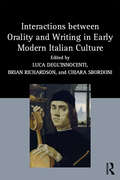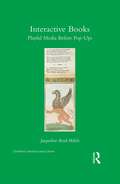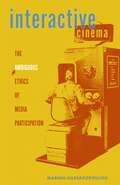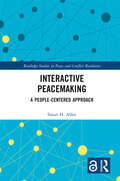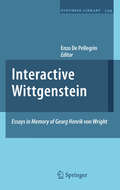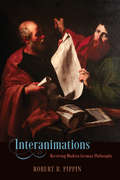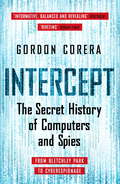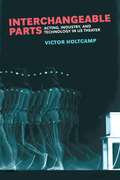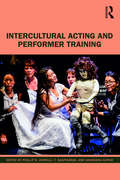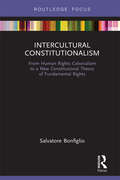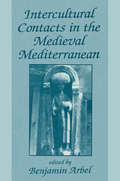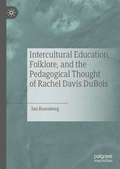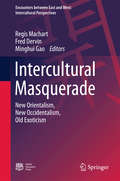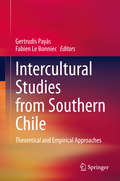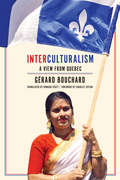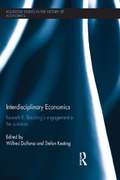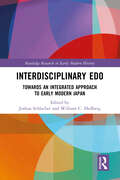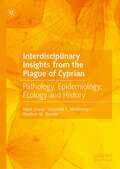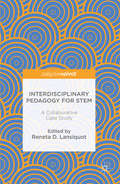- Table View
- List View
Intents and Purposes: Philosophy and the Aesthetics of Improvisation
by Eric LewisHow do we define improvised music? What is the relationship of highly improvised performances to the work they are performances of? How do we decide what are the important parts of an improvised musical work? In Intents and Purposes, Eric Lewis uses a series of case studies to challenge assumptions about what defines a musical work and musical performance, seeking to go beyond philosophical and aesthetic templates from Western classical music to foreground the distinctive practices and aesthetics of jazz. Pushing aside the assumption that composition and improvisation are different (or even opposed) musical practices, Lewis’s philosophically informed approach revisits key topics in musical ontology, such as how to define the triangle of composer-performer-listener, and the status of live performances in relation to scores and recordings. Drawing on critical race theory, feminist theory, new musicology, sociology, cognitive science, and genre theory, Lewis opens up new questions about agency in performance, as well as new ways of considering the historical relationships between improvisational practices with roots in different cultural frameworks. By showing how jazz can be both art, idea, and action all at the same time, Lewis offers a new way of seeing any improvised musical performance in a new culturally and aesthetically rich context.
Inter and Post-war Tourism in Western Europe, 1916–1960 (Palgrave Studies in Economic History)
by Carmelo Pellejero Martínez Marta Luque ArandaThis edited collection is a novel book with contributions from eleven expert researchers on the history of tourism in Europe. This book explores the growth of tourism in contemporary postwar Europe, especially during the periods following the First and Second World Wars and the Spanish Civil War. It reveals both the work carried out by social agents and institutions to develop tourism, and the contribution of tourism in boosting the economy and the recovery of morale in the Old Continent Its origin is the International Congress Postguerres / Aftermaths of War, organized by the Department of History and Archeology of the University of Barcelona, in Barcelona, in June 2019. In this Congress, professors Carmelo Pellejero and Marta Luque coordinated the session Post-war and tourism in contemporary Europe, in which all the authors of the book participated.
InterAsian Intimacies across Race, Religion, and Colonialism
by Chie IkeyaIn InterAsian Intimacies across Race, Religion, and Colonialism, Chie Ikeya asks how interAsian marriage, conversion, and collaboration in Burma under British colonial rule became the subject of political agitation, legislative activism, and collective violence. Over the course of the twentieth century relations between Burmese Muslims, Sino-Burmese, Indo-Burmese, and other mixed families and communities became flashpoints for far-reaching legal reforms and Buddhist revivalist, feminist, and nationalist campaigns aimed at consigning minority Asians to subordinate status and regulating women's conjugal and reproductive choices. Out of these efforts emerged understandings of religion, race, and nation that continue to vex Burma and its neighbors today.Combining multilingual archival research with family history and intergenerational storytelling, Ikeya highlights how the people targeted by such movements made and remade their lives under the shifting circumstances of colonialism, capitalism, and nationalism. The book illuminates a history of belonging across boundaries, a history that has been overshadowed by Eurocentric narratives about the mixing of white colonial masters and native mistresses. InterAsian intimacy was—and remains—foundational to modern regimes of knowledge, power, and desire throughout Asia.
Interacting Francoism: Entanglement, Comparison and Transfer between Dictatorships in the 20th Century (Routledge Studies in Modern History)
by Gutmaro Gómez Bravo José M. FaraldoThe book presents various investigation into 20th century European dictatorships, with its focus on Franco`s dictatorship and the Spanish Civil War. Francisco Franco’s dictatorship in Spain (1936/39-1975/78) was a modern form of authoritarianism, with a strong totalitarian period, like many other dictatorships of the time. Francoism occupies a place in history alongside other different dictatorships of its age, and a comparative analysis might prove to be a powerful tool in order to understand how, in the middle of the 20th century, such a repressive and authoritarian form of political control emerged. One of the most forgotten fascisms, which at the same time was influenced by and influenced other dictatorships, there are many aspects of the transnational connections of Francoism that remain under-researched. Following this methodology, Thus, an attempt is made to situate Francoism in the context of the other dictatorships of the time, in an attempt to transcend explanations centered on the nation. The chapters cover groundbreaking topics such as the Spanish civil war as one of the first total wars or Spanish fascism in context as one of the main European totalitarianisms. The chapters always have more than one dimension: they speak of interrelation, entanglement, collaboration, diffusion, in general, put the different dictatorships (essentially: Francoism, diverse Fascisms and Communism) in context and comparison.
Interacting with Print: Elements of Reading in the Era of Print Saturation (The Multigraph Collective)
by The Multigraph CollectiveA thorough rethinking of a field deserves to take a shape that is in itself new. Interacting with Print delivers on this premise, reworking the history of print through a unique effort in authorial collaboration. The book itself is not a typical monograph—rather, it is a “multigraph,” the collective work of twenty-two scholars who together have assembled an alphabetically arranged tour of key concepts for the study of print culture, from Anthologies and Binding to Publicity and Taste. Each entry builds on its term in order to resituate print and book history within a broader media ecology throughout the eighteenth and nineteenth centuries. The central theme is interactivity, in three senses: people interacting with print; print interacting with the non-print media that it has long been thought, erroneously, to have displaced; and people interacting with each other through print. The resulting book will introduce new energy to the field of print studies and lead to considerable new avenues of investigation.
Interactions between Orality and Writing in Early Modern Italian Culture
by Brian Richardson Luca Degl’Innocenti Chiara SbordoniInvestigating the interrelationships between orality and writing in elite and popular textual culture in early modern Italy, this volume shows how the spoken or sung word on the one hand, and manuscript or print on the other hand, could have interdependent or complementary roles to play in the creation and circulation of texts. The first part of the book centres on performances, ranging from realizations of written texts to improvisations or semi-improvisations that might draw on written sources and might later be committed to paper. Case studies examine the poems sung in the piazza that narrated contemporary warfare, commedia dell'arte scenarios, and the performative representation of the diverse spoken languages of Italy. <P><P> The second group of essays studies the influence of speech on the written word and reveals that, as fourteenth-century Tuscan became accepted as a literary standard, contemporary non-standard spoken languages were seen to possess an immediacy that made them an effective resource within certain kinds of written communication. The third part considers the roles of orality in the worlds of the learned and of learning. The book as a whole demonstrates that the borderline between orality and writing was highly permeable and that the culture of the period, with its continued reliance on orality alongside writing, was often hybrid in nature.
Interactive Books: Playful Media before Pop-Ups (Children's Literature and Culture)
by Jacqueline Reid-WalshMovable books are an innovative area of children’s publishing. Commonly equated with spectacular pop-ups, movable books have a little-known history as interactive, narrative media. Since they are hybrid artifacts consisting of words, images and movable components, they cross the borders between story, toy, and game. Interactive Books is a historical and comparative study of early movable books in relation to the children who engage with them. Jacqueline Reid-Walsh focuses on the period movable books became connected with children from the mid-17th to the early-19th centuries. In particular, she examines turn-up books, paper doll books, and related hybrid experiments like toy theaters and paignion (or domestic play set) produced between 1650 and 1830. Despite being popular in their own time, these artifacts are little known today. This study draws attention to a gap in our knowledge of children’s print culture by showing how these artifacts are important in their own right. Reid-Walsh combines archival research with children’s literature studies, book history, and juvenilia studies. By examining commercially produced and homemade examples, she explores the interrelations among children, interactive media, and historical participatory culture. By drawing on both Enlightenment thinkers and contemporary digital media theorists Interactive Books enables us to think critically about children’s media texts paper and digital, past and present.
Interactive Cinema: The Ambiguous Ethics of Media Participation (Electronic Mediations #63)
by Marina HassapopoulouConnecting interactive cinema to media ethics and global citizenship Interactive Cinema explores various cinematic practices that work to transform what is often seen as a primarily receptive activity into a participatory, multimedia experience. Surveying a multitude of unorthodox approaches throughout the history of motion pictures, Marina Hassapopoulou offers insight into a range of largely ephemeral and site-specific projects that consciously assimilate viewers into their production. Analyzing examples of early cinema, Hollywood B movies, museum and gallery installations, virtual-reality experiments, and experimental web-based works, Hassapopoulou travels across numerous platforms, highlighting a diverse array of strategies that attempt to unsettle the allegedly passive spectatorship of traditional cinema. Through an exploration of these radically inventive approaches to the medium, many of which emerged out of sociopolitical crises and periods of historical transition, she works to expand notions of interactivity by considering it in both technological and phenomenological terms. Deliberately revising and expanding Eurocentric scholarship to propose a much broader, transnational scope, the book emphasizes the ethical dimensions of interactive media and their links to larger considerations around community building, citizenship, and democracy. By combining cutting-edge theory with updated conventional film studies methodologies, Interactive Cinema presses at the conceptual limits of cinema and offers an essential road map to the rapidly evolving landscape of contemporary media.
Interactive Peacemaking: A People-Centered Approach (Routledge Studies in Peace and Conflict Resolution)
by Susan H. AllenThis book examines the theory and practice of interactive peacemaking, centering the role of people in making peace. The book presents the theory and practice of peacemaking as found in contemporary processes globally. By putting people at the center of the analysis, it outlines the possibilities of peacemaking by and for the people whose lives are touched by ongoing conflicts. While considering examples from around the world, this book specifically focuses on peacemaking in the Georgian-South Ossetian context. It tells the stories of individuals on both sides of the conflict, and explores why people choose to make peace, and how they work within their societies to encourage this. This book emphasizes theory built from practice and offers methodological guidance on learning from practice in the conflict resolution field. This book will be of much interest to students and practitioners of peacemaking, conflict resolution, South Caucasus politics and International Relations.
Interactive Wittgenstein
by Enzo De PellegrinThe philosophical thought of Ludwig Wittgenstein continues to have a profound influence that transcends barriers between philosophical disciplines and reaches beyond philosophy itself. Less than one hundred years after their publication, his early masterpiece 'Tractatus Logico-Philosophicus' and the posthumously published 'Philosophical Investigations' have emerged as two classic philosophical texts, each of which has elicited widely divergent readings and spawned contesting schools of interpretation. This collection of original essays by leading experts offers deep insights into the forces that shaped and influenced Wittgenstein's thought on a broad variety of topics. It also contains the text - in both the original German and an English translation by Juliet Floyd and Burton Dreben - of letters and cards sent to Wittgenstein by the philosopher and logician Gottlob Frege, which shed light on their interaction during the crucial period when Wittgenstein completed work on the 'Tractatus'. This important record of a philosophical friendship is complemented by a scholarly apparatus and an introduction. Other essays featured in this volume document and discuss Wittgenstein's thinking on music and religion as well as issues that take center stage in the 'Investigations' such as Wittgenstein's account of rule-following. The volume provides an invaluable research tool not only for students of the history of philosophy and for scholars of both Wittgenstein and Frege but also for anyone interested in the intellectual history of the first half of the twentieth century.
Interanimations: Receiving Modern German Philosophy
by Robert B. PippinIn this latest book, renowned philosopher and scholar Robert B. Pippin offers the thought-provoking argument that the study of historical figures is not only an interpretation and explication of their views, but can be understood as a form of philosophy itself. In doing so, he reconceives philosophical scholarship as a kind of network of philosophical interanimations, one in which major positions in the history of philosophy, when they are themselves properly understood within their own historical context, form philosophy’s lingua franca. Examining a number of philosophers to explore the nature of this interanimation, he presents an illuminating assortment of especially thoughtful examples of historical commentary that powerfully enact philosophy. After opening up his territory with an initial discussion of contemporary revisionist readings of Kant’s moral theory, Pippin sets his sights on his main objects of interest: Hegel and Nietzsche. Through them, however, he offers what few others could: an astonishing synthesis of an immense and diverse set of thinkers and traditions. Deploying an almost dialogical, conversational approach, he pursues patterns of thought that both shape and, importantly, connect the major traditions: neo-Aristotelian, analytic, continental, and postmodern, bringing the likes of Heidegger, Honneth, MacIntyre, McDowell, Brandom, Strauss, Williams, and Žižek—not to mention Hegel and Nietzsche— into the same philosophical conversation. By means of these case studies, Pippin mounts an impressive argument about a relatively under discussed issue in professional philosophy—the bearing of work in the history of philosophy on philosophy itself—and thereby he argues for the controversial thesis that no strict separation between the domains is defensible.
Intercept: The Secret History of Computers and Spies
by Gordon CoreraThe computer was born to spy, and now computers are transforming espionage. But who are the spies and who is being spied on in today's interconnected world? This is the exhilarating secret history of the melding of technology and espionage. Gordon Corera's compelling narrative, rich with historical details and characters, takes us from the Second World War to the internet age, revealing the astonishing extent of cyberespionage carried out today. Drawing on unique access to intelligence agencies, heads of state, hackers and spies of all stripes, INTERCEPT is a ground-breaking exploration of the new space in which the worlds of espionage, geopolitics, diplomacy, international business, science and technology collide. Together, computers and spies are shaping the future. What was once the preserve of a few intelligence agencies now matters for us all.
Intercept: The Secret History of Computers and Spies
by Gordon CoreraThe computer was born to spy, and now computers are transforming espionage. But who are the spies and who is being spied on in today's interconnected world? This is the exhilarating secret history of the melding of technology and espionage. Gordon Corera's compelling narrative, rich with historical details and characters, takes us from the Second World War to the internet age, revealing the astonishing extent of cyberespionage carried out today. Drawing on unique access to intelligence agencies, heads of state, hackers and spies of all stripes, INTERCEPT is a ground-breaking exploration of the new space in which the worlds of espionage, geopolitics, diplomacy, international business, science and technology collide. Together, computers and spies are shaping the future. What was once the preserve of a few intelligence agencies now matters for us all.
Interchangeable Parts: Acting, Industry, and Technology in US Theater (Theater: Theory/Text/Performance)
by Victor HoltcampWhile Hollywood has long been called “The Dream Factory,” and theatrical entertainment more broadly has been called “The Industry,” the significance of these names has rarely been explored. There are in fact striking overlaps between industrial rhetoric and practice and the development of theatrical and cinematic techniques for rehearsal and performance. Interchangeable Parts examines the history of acting pedagogy and performance practice in the United States, and their debts to industrial organization and philosophy. Ranging from the late nineteenth century through the end of the twentieth, the book recontextualizes the history of theatrical technique in light of the embrace of industrialization in US culture and society. Victor Holtcamp explores the invocations of scientific and industrial rhetoric and philosophy in the founding of the first schools of acting, and echoes of that rhetoric in playwriting, production, and the cinema, as Hollywood in particular embraced this industrially infected model of acting. In their divergent approaches to performance, the major US acting teachers (Lee Strasberg, Stella Adler, and Sanford Meisner) demonstrated strong rhetorical affinities for the language of industry, illustrating the pervasive presence of these industrial roots. The book narrates the story of how actors learned to learn to act, and what that process, for both stage and screen, owed to the interchangeable parts and mass production revolutions.
Intercultural Acting and Performer Training
by Zarrilli Phillip T Sasitharan Anuradha KapurIntercultural Acting and Performer Training is the first collection of essays from a diverse, international group of authors and practitioners focusing on intercultural acting and voice practices worldwide. This unique book invites performers and teachers of acting and performance to explore, describe, and interrogate the complexities of intercultural acting and actor/performer training taking place in our twenty-first century, globalized world. As global contexts become multi-, inter- and intra-cultural, assumptions about what acting "is" and what actor/performer training should be continue to be shaped by conventional modes, models, techniques and structures. This book examines how our understanding of interculturalism changes when we shift our focus from the obvious and highly visible aspects of production to the micro-level of training grounds, studios, and rehearsal rooms, where new forms of hybrid performance are emerging. Ideal for students, scholars and practitioners, Intercultural Acting and Performer Training offers a series of accessible and highly readable essays which reflect on acting and training processes through the lens offered by "new" forms of intercultural thought and practice.
Intercultural Constitutionalism: From Human Rights Colonialism to a New Constitutional Theory of Fundamental Rights
by Salvatore BonfiglioThis book argues that the effective protection of fundamental rights in a contemporary, multicultural society requires not only tolerance and respect for others, but also an ethics of reciprocity and a pursuit of dialogue between different cultures of human rights. Nowadays, all cultures tend to claim an equitable arrangement that can be articulated in the terms of fundamental rights and in the multicultural organization of the State. Starting from the premise that every culture is and always was intercultural, this book elaborates a new, and more fundamentally, pluralist view of the relationship between rights and cultural identity. No culture is pure; from the perspective of an irreducible cultural contamination, this book argues, it is possible to formulate constitutional idea of diversity that is properly intercultural. This concept of intercultural constitutionalism is not, then, based on abstract principles, but nor is it bound to any particular cultural norm. Rather, intercultural constitutionalism allows the interpretation of rights, rules and legal principles, which are established in different contexts.
Intercultural Contacts in the Medieval Mediterranean: Studies in Honour of David Jacoby
by Benjamin ArbelThese essays by medievalists touch upon many aspects of intercultural links in the medieval Mediterranean, covering not only strictly cultural and religious contacts, but also political, military, ethnic, social institutional, scientific and technological relationships.
Intercultural Education, Folklore, and the Pedagogical Thought of Rachel Davis DuBois
by Jan RosenbergThis book provides a history of the Quaker educator and intercultural education pioneer Rachel Davis DuBois (1892-1993) that explores the period in which DuBois lived and the key works she created. The opening section establishes the disciplinary contexts of her work, education, and folklore, and the subsequent sections present DuBois' pedagogical methods as they were developed and exemplified by her programs. Throughout the narrative, Rosenberg includes reflections on her own experience as a practitioner of the intercultural and folklife education DuBois championed.
Intercultural Masquerade
by Fred Dervin Regis Machart Minghui GaoThis volume revisits the notions of Orientalism, Occidentalism and, to a certain extent, Reverse Orientalism/Occidentalism in the 21st century, adopting post-modern, constructionist and potentially non-essentialising approaches. The representations of the 'cultural Other' in education, literature and the arts are examined by scholars working in Australia, France, Hong Kong, Japan, Malaysia, Singapore and the USA. Vinyl compilations, TV series, novels, institutional discourses and surveys, amongst others, are examined so as to better understand how people construct their identity in relation to an imagined and idealised Other. This book will appeal to all researchers and students interested in cultural identity and stereotypes of the 'East' and the 'West', in particular in the fields of academic mobility, cultural studies, intercultural education, postcolonial literature and media studies.
Intercultural Studies from Southern Chile: Theoretical and Empirical Approaches
by Gertrudis Payàs Fabien Le BonniecThis book presents a multidisciplinary overview of a little known interethnic conflict in the southernmost part of the Americas: the tensions between the Mapuche indigenous people and the settlers of European descent in the Araucania region, in southern Chile. Politically autonomous during the colonial period, the Mapuche had their land confiscated, their population decimated and the survivors displaced and relocated as marginalized and poor peasants by Chilean white settlers at the end of the nineteenth century, when Araucania was transformed in a multi-ethnic region marked by numerous tensions between the marginalized indigenous population and the dominant Chileans of European descent.This contributed volume presents a collection of papers which delve into some of the intercultural dilemmas posed by these complex interethnic relations. These papers were originally published in Spanish and French and provide a sample of the research activities of the Núcleo de Estudios Interétnicos e Interculturales (NEII) at the Universidad Católica de Temuco, in the capital of Araucania. The NEII research center brings together scholars from different fields: sociocultural anthropology, sociolinguistics, ethno-literature, intercultural education, intercultural philosophy, ethno-history and translation studies to produce innovative research in intercultural and interethnic relations. The chapters in this volume present a sample of this work, focusing on three main topics: The ambivalence between the inclusion and exclusion of indigenous peoples in processes of nation-building.The challenges posed by the incorporation of intercultural practices in the spheres of language, education and justice.The limitations of a functional notion of interculturality based on eurocentric thought and neoliberal economic rationality. Intercultural Studies from Southern Chile: Theoretical and Empirical Approaches will be of interest to anthropologists, linguists, historians, philosophers, educators and a range of other social scientists interested in intercultural and interethnic studies.
Interculturalism
by Charles Taylor Howard Scott Gerard BouchardAccommodating ethnic diversity is a major challenge for all democratic nations and a topic that has attracted a great deal of attention in the last few decades. Within Quebec, a new approach has emerged that seeks a balance between the needs of minorities and those of the majority.In Interculturalism, sociologist and historian Gérard Bouchard presents his vision of interculturalism as a model for the management of diversity. A pluralist approach which recognizes the existence of a cultural majority whose rights must also be acknowledged, interculturalism constitutes an important alternative to multiculturalism both in Canada and internationally. Written by one of Quebec's leading public intellectuals and the co-chair of the Bouchard-Taylor Commission on reasonable accommodation, Interculturalism is the first clear and comprehensive statement in English of an approach being discussed around the world.A translation of Bouchard's award-winning French-language work, L'Interculturalisme: Un point de vue québécois, this book features a new foreword by philosopher Charles Taylor and an afterword by the author written specifically for the English-language edition.
Interdisciplinary Economics: Kenneth E. Boulding’s Engagement in the Sciences (Routledge Studies in the History of Economics #155)
by Wilfred Dolfsma Stefan KestingKenneth Boulding was a prolific writer across so many different fields that not only is he often much referred to and cited, he is considered a core member of many of these fields. Boulding is the quintessential interdisciplinary scholar. He died in 1993, but he has left a legacy in economics, conflict studies, systems theory, ecology, biology, communication studies, and ethics. As an economist proper he has tested and expanded the boundaries of that field without unduly "invading" and undermining the expertise and established knowledge of the other social sciences. This proposed volume will allow scholars who have worked or are starting to work in areas that Boulding has initiated, established and made a continued contribution to, to understand the links between these fields and other related ones. The volume will establish a source of inspiration for some time to come.
Interdisciplinary Edo: Toward an Integrated Approach to Early Modern Japan (Routledge Research in Early Modern History)
by William C. Hedberg Joshua SchlachetInterdisciplinary Edo brings together scholars from across the methodological spectrum to explore new approaches to innovative humanistic research on early modern Japan (1603–1868). It makes an intervention in the field by thinking across conventional disciplinary boundaries toward a holistic and cohesive approach to Japan’s early modern period. By taking historical, religious, literary, and art historical analyses into account, the contributors hope to begin a new, transdisciplinary conversation on political formation, social interaction, and cultural proliferation under the “Great Peace” of the Tokugawa regime.This book comprises 14 essays by specialists of history, literature, religious studies, and art history. Major topics include Edo-period Japan’s cultural, intellectual, and economic connections to the early modern world; environmental humanities and material culture; popular culture and aesthetics; and the question of how contemporary academic demarcation lines impact the current study of Tokugawa Japan. Individual essays range in scale from individual paintings and works of prose fiction to the tectonic plates underlying the Yamashiro basin and span topics from overseas medicinal exchange and premodern cartography to the history of intoxication.Interdisciplinary Edo will be of immediate interest to all scholars focusing on the early modern period, as well as to researchers studying other periods of Japanese studies. As part of an ongoing and inclusive process of pluralizing and deprovincializing global conceptions of early modernity, this book will contribute to historiographical interventions outside Japan studies as well.
Interdisciplinary Insights from the Plague of Cyprian: Pathology, Epidemiology, Ecology and History
by Mark Orsag Amanda E. McKinney DeeAnn M. ReederThis book tackles the difficult challenge of uncovering the pathogenic cause, epidemiological mechanics and broader historical impacts of an extremely deadly third-century ancient Roman pandemic. The core of this research is embodied in a novel systems synthesis methodology that allows for ground-breaking historical-scientific problem-solving. Through precise historical and scientific problem-solving, analysis and modelling, the authors piece together a holistic puzzle portrait of an ancient plague that is fully consistent, in turn, with both the surviving ancient evidence and the latest in cutting edge twenty-first-century modern medical and molecular phylogenetic science. Demonstrating the broader relevance of the crisis-beset world of the third-century Roman Empire in providing guiding and cautionary historical lessons for the present, this innovative book provides fascinating insights for students and scholars across a range of disciplines.
Interdisciplinary Pedagogy for STEM
by Reneta D. LansiquotThis book focuses on constructivist theory and collaborative interdisciplinary studies, showing how constructivist theory complements interdisciplinary studies. Constructivist theory stresses how learners construct new ideas and concepts, while the interdisciplinary method requires that learners approach complex problems from multiple perspectives. The author uses the New York City College of Technology as a model to demonstrate how learning can be embedded in complex, realistic, and relevant environments. As a result, students learn to consider significant issues from a variety of viewpoints and thus negotiate their social landscape. In approaching problems that they recognize as meaningful, they take ownership of their learning and become increasingly self-aware. This scholarly book makes a theoretical contribution to its field while also offering a practical, real world example of how to successfully integrate a curriculum.
